I am trying to decode a MJPEG stream with libav. The stream comes from V4L2 driver. When working with high resolutions the following code works fine. However, when using low resolutions (For instance 320x190) it produces strange artefacts
void V4L2::compressedCapturingThread(){
const AVCodec *codec=avcodec_find_decoder(m_currVidMode.codec.toAVCodecID());
if(!codec)
return; //Something went horribly wrong
//Allocate the context
AVCodecContext* codecCtx=avcodec_alloc_context3(codec);
if(!codecCtx){
return; //Error
}
codecCtx->width=m_currVidMode.res.width;
codecCtx->height=m_currVidMode.res.height;
//Open the context
if (avcodec_open2(codecCtx, codec, nullptr) < 0) {
avcodec_free_context(&codecCtx);
return;
}
//Allocate space for the packet
AVPacket *pkt=av_packet_alloc();
if(!pkt){
avcodec_free_context(&codecCtx);
return;
}
AVFrame* decodedFrame=av_frame_alloc();
if(!decodedFrame){
avcodec_free_context(&codecCtx);
avcodec_free_context(&codecCtx);
return;
}
Graphics::Uploader uplo;
v4l2_buffer buf;
int ret;
Utils::ImageBuffer decodedImgBuf(
Utils::ImageAttributes(
m_currVidMode.res,
m_currVidMode.pixFmt
), (u_int8_t*)nullptr
);
//Main loop
while(!m_threadExit){
reqBuffer(&buf);
if(!buf.bytesused){
continue;
}
//Create the packet with the given data
u_int8_t* bufData=(u_int8_t*)av_malloc(buf.bytesused);
memcpy(bufData, m_buffers[buf.index].buffer, buf.bytesused); //copy the data
av_packet_from_data (pkt, bufData, buf.bytesused);
freeBuffer(&buf); //V4L2 buffer no longer needed
//Try to decode the packet
ret=avcodec_send_packet(codecCtx, pkt);
av_packet_unref(pkt);
if(ret<0){
continue;
}
ret = avcodec_receive_frame(codecCtx, decodedFrame);
if(ret<0){
continue;
}
memcpy(decodedImgBuf.data, decodedFrame->data, sizeof(decodedImgBuf.data)); //Copy plane pointers
if(decodedImgBuf.att.pixFmt == Utils::PixelFormats::NONE){
decodedImgBuf.att.pixFmt=Utils::PixelFormat(codecCtx->pix_fmt);
//Change deprecated formats
if(decodedImgBuf.att.pixFmt == Utils::PixelFormats::YUVJ420P)
decodedImgBuf.att.pixFmt = Utils::PixelFormats::YUV420P;
else if(decodedImgBuf.att.pixFmt == Utils::PixelFormats::YUVJ422P)
decodedImgBuf.att.pixFmt = Utils::PixelFormats::YUV422P;
else if(decodedImgBuf.att.pixFmt == Utils::PixelFormats::YUVJ440P)
decodedImgBuf.att.pixFmt = Utils::PixelFormats::YUV440P;
else if(decodedImgBuf.att.pixFmt == Utils::PixelFormats::YUVJ444P)
decodedImgBuf.att.pixFmt = Utils::PixelFormats::YUV444P;
}
std::unique_ptr<const Graphics::Frame> frame;
{
Graphics::UniqueContext ctx(Graphics::Context::getAvalibleCtx());
frame=uplo.getFrame(decodedImgBuf);
}
Stream::AsyncSource<Graphics::Frame>::push(std::move(frame));
}
//Free everything
avcodec_free_context(&codecCtx);
av_packet_free(&pkt);
av_frame_free(&decodedFrame);
}
If I try to read the AVFrame's contents to disk just after avcodec_receive_frame() I get the mentioned "strange results" (I see it by uploading it to rawpixels.net ), so the problem is not after this line. If I save the pkt 's data to disk as JPEG just before freeBuffer() the image can be seen properly. I'll attach some pictures
The complete code can be found at:
https://github.com/oierlauzi/zuazo
https://github.com/oierlauzi/zuazo/blob/master/src/Zuazo/Sources/V4L2.cpp
Edit 1: I forgot to mention, codecCtx->pix_fmt has the value of AL_PIX_FMT_YUVJ422P (given by libav)

